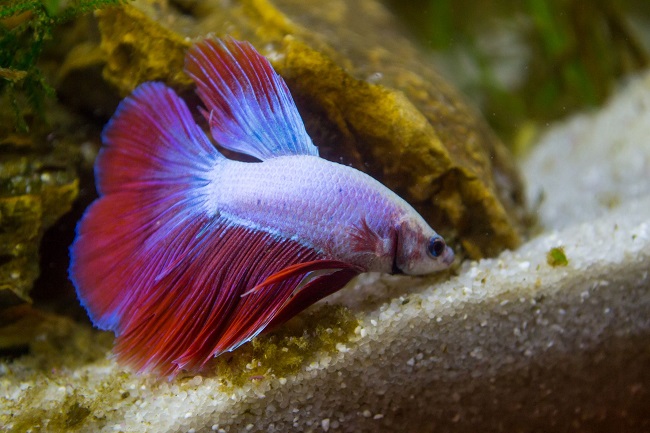Feeding a Betta fish isn’t just about tossing food into the tank. The frequency, quantity, and type of food you offer all contribute to your Betta’s health, lifespan, and overall well-being.
This article dives into the nuances of feeding Betta fish, providing a complete guide on how often to feed Betta fish to ensure their vibrant and healthy life.

Understanding Betta Fish Dietary Needs in Detail
Betta fish, also known as Siamese fighting fish, are insectivores in their natural habitat. They primarily feed on insect larvae, small insects, and even tiny crustaceans.
Read Also:
In captivity, their dietary needs are best met with high-protein foods. High-quality Betta-specific pellets or flakes often serve as a staple in their diet. These specially formulated foods consider the Betta’s protein requirement and include essential nutrients and vitamins.
Additionally, supplementing with live or freeze-dried foods can add variety to their diet and stimulate natural hunting behaviors. Choices can include bloodworms, daphnia, and brine shrimp. However, these should be considered treats and not replace the staple diet.
Feeding Frequency: Striking the Right Balance
Understanding how often to feed your Betta is crucial in preventing overfeeding or underfeeding. Adult Betta fish typically require feeding once or twice a day. A good rule of thumb is to feed them only what they can consume within 2-3 minutes.
Overfeeding can lead to severe health issues. Uneaten food left in the tank can degrade water quality, contributing to an unhealthy environment. Meanwhile, Bettas eating too much can develop problems like obesity, bloating, constipation, and swim bladder disease.
Swim Bladder Disease: A Result of Overfeeding
Swim bladder disease in Betta fish can occur when their swim bladder – an organ that helps in maintaining buoyancy – becomes impaired. Overfeeding is a common cause.
Affected fish may swim at an unusual angle or struggle to maintain their balance. It’s essential to monitor your Betta’s eating habits to prevent such conditions.
Fasting Your Betta Fish: A Preventive Measure
An occasional day of fasting can be beneficial for your Betta’s health. Given their tendency to overeat, a day without food once a week gives their digestive system a chance to rest and fully process the food. This practice can help prevent constipation and other digestive issues.
Adapting Feeding Schedules for Young and Elderly Betta Fish
Different stages of life may require alterations to your Betta’s feeding schedule. For example, younger Betta fish are still growing and often need to be fed more frequently than adults. It’s common to feed juvenile Bettas 3 times a day in smaller amounts.
On the other hand, older Betta fish may have slower metabolism and less appetite, which can result in a need to reduce feeding frequency. It’s crucial to watch for changes in appetite or behavior as your Betta ages.
Understanding Betta Fish Behavior During Feeding
Betta fish are known for their vivacious personalities, and this can often shine through during feeding times. Observing your Betta’s behavior when feeding can provide useful insights into their health and well-being.
Healthy Bettas are usually eager eaters. If you notice changes in your Betta’s eating habits, such as loss of appetite or difficulty eating, it may be a sign of illness or stress.
Adjusting Feeding Schedules Based on Tank Parameters
The environment in which your Betta lives can also influence how often you should feed them. Warmer water can speed up a Betta’s metabolism, meaning they may need to be fed a little more often.
Conversely, a cooler environment can slow down metabolism, which may require less frequent feeding. Always ensure your Betta’s tank temperature is in the optimal range of 78-80 degrees Fahrenheit for their health.
Betta Fish Food Storage and Quality
Proper storage of Betta fish food is vital to ensure its nutritional quality. Most fish food should be stored in a cool, dry place to maintain its nutrient content.
Once opened, try to use dry fish food like pellets or flakes within three months. After this time, the food may start to lose its nutritional value.
Read Also:
Conclusion
Understanding how often to feed your Betta fish and what to feed them is essential for their health and longevity. By feeding them a high-protein diet, monitoring their feeding to prevent overfeeding, and including a fasting day, you can ensure your Betta fish leads a healthy, vibrant life.
























